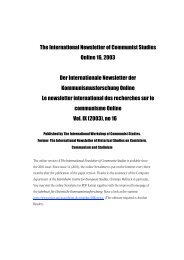Vol. XIII (2007), no 20 - The International Newsletter of Communist ...
Vol. XIII (2007), no 20 - The International Newsletter of Communist ...
Vol. XIII (2007), no 20 - The International Newsletter of Communist ...
Sie wollen auch ein ePaper? Erhöhen Sie die Reichweite Ihrer Titel.
YUMPU macht aus Druck-PDFs automatisch weboptimierte ePaper, die Google liebt.
<strong>The</strong> <strong>International</strong> Newletter <strong>of</strong> <strong>Communist</strong> Studies Online <strong>XIII</strong> (<strong><strong>20</strong>07</strong>), <strong>no</strong> <strong>20</strong> 138<br />
propagate new communist methods but rather considered the old local traditions to represent<br />
communist thinking. After 1945 its attitude has been similar.<br />
Kansan Tahto has defended the eco<strong>no</strong>mic interests <strong>of</strong> the workers in Northern Finland in<br />
particular. <strong>The</strong> newspaper was born at the same moment as the forest workers in Lapland had<br />
their first large strikes, and it sided with the forest workers against the forest companies.<br />
Though Kansan Tahto did <strong>no</strong>t initially agree with the local forest workers about their forms <strong>of</strong><br />
organisations, it has demanded improvement <strong>of</strong> their working conditions and salaries from the<br />
19<strong>20</strong>s up to the 1970s.<br />
Concern for the subsistence <strong>of</strong> the working people in Northern Finland got its first strong<br />
expressions in Kansan Tahto as a result <strong>of</strong> the food shortage during World War I. Besides the<br />
workers in towns, the newspaper has expressed its concern for the smallholders in Northern<br />
Finland. In its first years Kansan Tahto wanted to get land for tenants and farm workers.<br />
According to it, the land reforms after the Civil War were failures, and the newspaper<br />
demanded more land for those who had bought a small farm. After 1945 the newspaper spoke<br />
in strong words for additional land for the owners <strong>of</strong> small holdings formed after the war. In<br />
the late 1950s it went as far as to claim that the agricultural policy would depopulate the<br />
countryside in Northern Finland. It was perhaps because <strong>of</strong> the large migration from country<br />
to towns and from <strong>no</strong>rthern Finland to Sweden and Southern Finland that Kansan Tahto’s<br />
interest in small-holders weakened in the mid-1960s.<br />
Seasonal unemployment was an acute problem for the smallholder - forest worker in<br />
Northern Finland from the beginning <strong>of</strong> the <strong>20</strong> th century. Kansan Tahto took the question on<br />
its pages during World War I, but it was only in the 19<strong>20</strong>s that the paper reminded it to be a<br />
social-political problem which needed solving. At first the newspaper demanded work or<br />
assistance for the unemployed. From the 1940s it opposed sending <strong>of</strong> the unemployed to road<br />
construction works far from their homes.<br />
After the Second World War Kansan Tahto had a very optimistic attitude to the rise <strong>of</strong><br />
Northern Finland by means <strong>of</strong> industrialisation. <strong>The</strong> newspaper was among the initiators <strong>of</strong><br />
the movements to get new industrial plants in Northern Finland and contributed to the<br />
foundation <strong>of</strong> large chemical, iron and steel factories in the area between the 1950s and<br />
1970s.<br />
Though eco<strong>no</strong>mic questions were <strong>of</strong> importance for Kansan Tahto, it also wanted to raise<br />
independent and civilised workers. After 1907 that indicated publication <strong>of</strong> classics <strong>of</strong> world<br />
literature. Kansan Tahto favoured such Russian and Scandinavian realists as Leo Tolstoy,<br />
Maxim Gorky, Fedor Dostoyevsky, Anton Chekhov, August Strindberg but also Jack London.<br />
After the Civil War cultural questions were <strong>no</strong>t regarded as important, though Revontulet<br />
(Northern Lights), a literary weekly published in 1926-30, published classics and articles <strong>of</strong><br />
the local workers. After 1945 the cultural issues did <strong>no</strong>t get as much attention, though the<br />
SKDL put a strong stress on them.<br />
<strong>The</strong> years 1965-68 were the high point <strong>of</strong> cultural questions in Kansan Tahto. It was the first<br />
and only time it also had a special cultural editor. Thus the newspaper also wanted to be<br />
involved in breaking the old truths created after the Civil War and establishing a new kind <strong>of</strong><br />
values, <strong>no</strong>rms and habits. That phase was, however, <strong>no</strong>t <strong>of</strong> long duration, and the newspaper<br />
took defending positions as the bourgeoisie started its counterattack at the turn <strong>of</strong> the<br />
decade.














